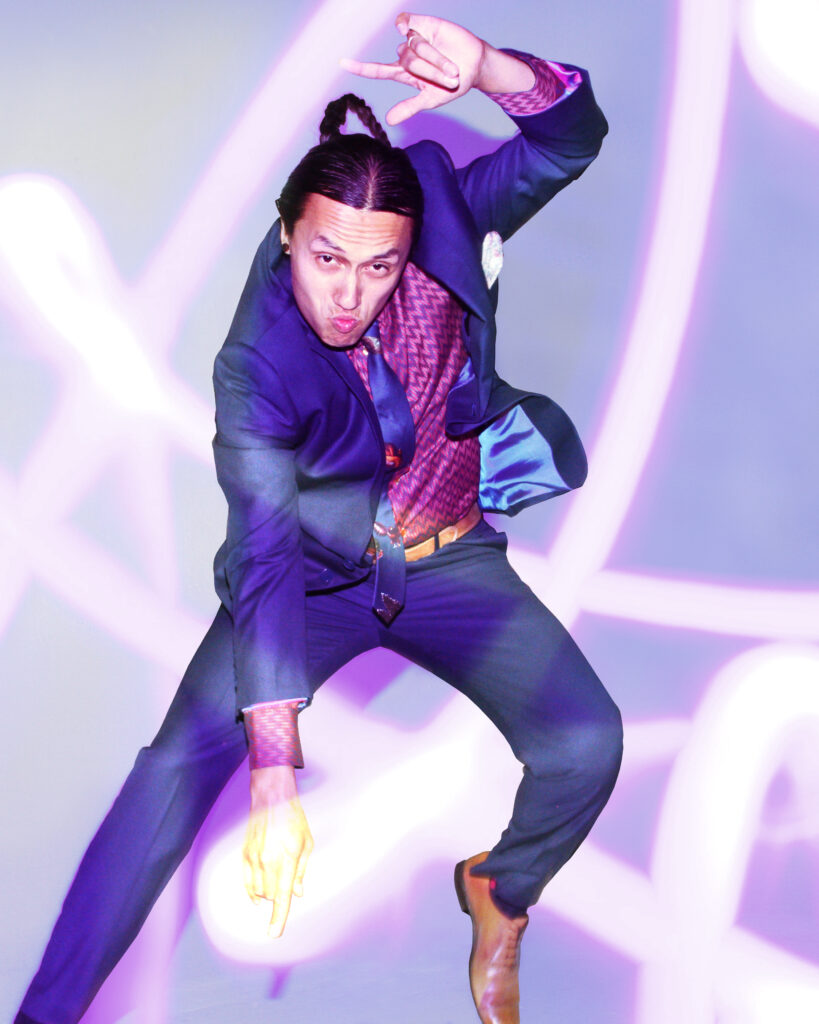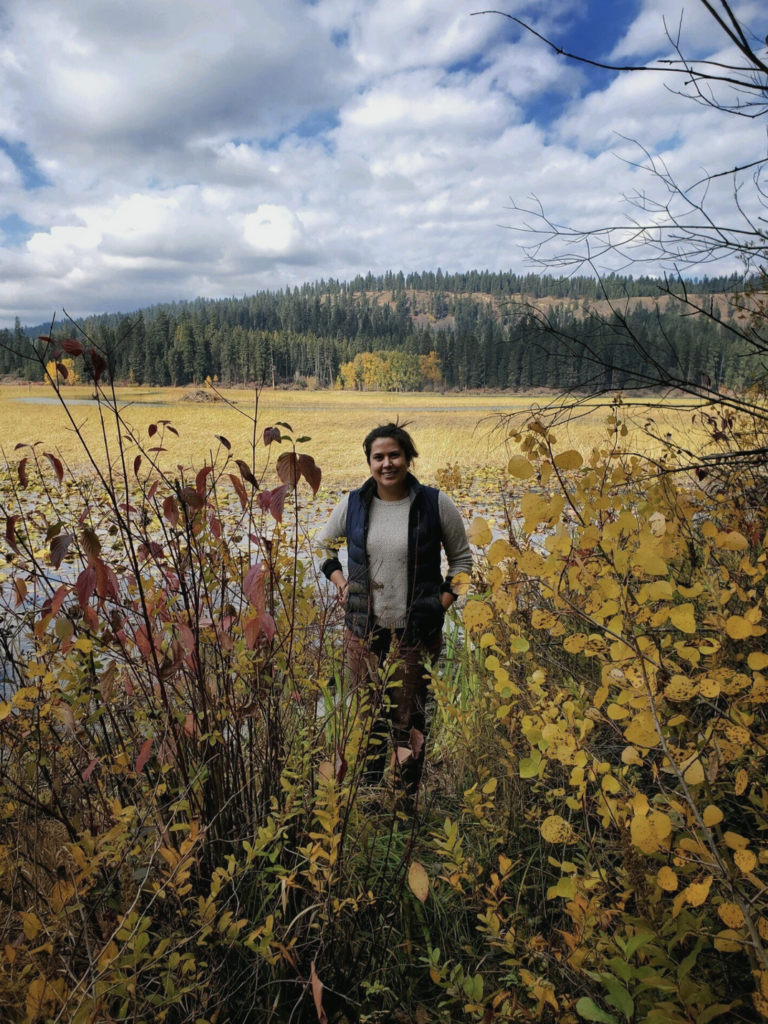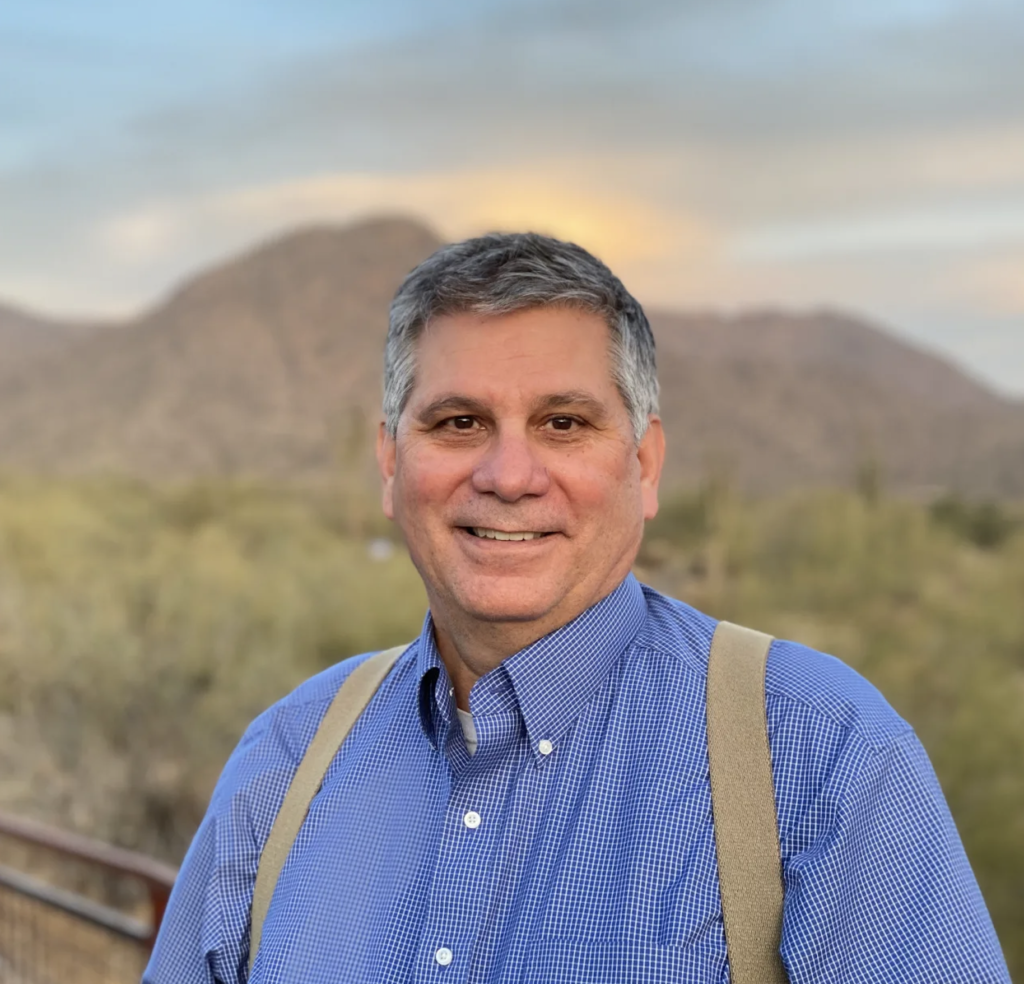
The Battle to Break Through: Reclaiming Indigenous Narratives explores the importance of visibility and how four prominent leaders are working to break through to create more opportunities for Indigenous people.
Over the past few years, we have seen a burst of Indigenous representation in mainstream media. From the success of shows like Reservation Dogs and Rutherford Falls to the confirmation of the first Native American to serve as a cabinet secretary, Indigenous voices are reclaiming the narrative to tell their own stories.
What did it take to get here? We talk with friends from around Indian Country who have worked to combat ideologies and stereotypes about Native American/Alaskan Native communities. They shared about the significance of visibility, what the future holds, and the importance of continuing to breakthrough and creating opportunities for more Indigenous people.

Kewa Pueblo
Aliyah Chavez is an anchor and producer at ICT, formerly known as Indian Country Today. Aside from her work at ICT, Aliyah co-hosts “Break It Down” on Arizona PBS. Her reporting covers a wide range of topics from the coronavirus pandemic to the 2020 presidential election. She also enjoys reporting features on vital members of Indian Country, including elders and small business owners. She started at ICT in June 2019. Aliyah is an alumna of Stanford University where she earned her bachelor’s and master’s degrees. In her free time, she enjoys eating breakfast burritos and spending time with her many cousins and relatives.

Sisseton-Wahpeton Dakota
Bobby “Dues” Wilson is an actor, writer, poet, visual artist, and comedian, and a founding member of Indigenous Sketch Comedy group The 1491s. Bobby has appeared as an actor on THE DAILY SHOW and WHAT WE DO IN THE SHADOWS (FX). He has been a writer and actor on RUTHERFORD FALLS (Peacock / UniTV) and RESERVATION DOGS (FX).

Coeur d’Alene Tribe
Maria Givens is co-founder of Tahoma Peak Solutions. Maria has worked in the US Senate, for the National Congress of American Indians, and for the Native American Agriculture Fund, where she built the communications structure of the largest private charitable trust serving Indian Country. At NCAI, Maria was the organization’s lead for the Native Farm Bill Coalition that secured 63 tribal provisions in the 2018 Farm Bill. In addition, she helped secure the retirement of the Chief Wahoo logo from Cleveland’s Major League Baseball team.
From 2015-2016, Maria served in US Senator Jeff Merkley’s Washington, D.C. office where she secured language in the 2016 Water Infrastructure Improvements for the Nation Act igniting her passion for food sovereignty work that brought tribal people closer to their food source through federal policy.
Maria has her Masters of the Environment from the University of Colorado with a specialization in Sustainable Food Systems and graduated from the University of Washington- Seattle in 2013 with degrees in Political Science and American Indian Studies.

Shoshone-Bannock
Mark Trahant is editor of Indian Country Today. Under Trahant’s leadership, Indian Country Today launched the first national daily newscast available through stations in the PBS network. The digital platform reaches more than 400,000 people each month.
He has been a professor at the University of North Dakota, the University of Alaska Anchorage, the University of Idaho and the University of Colorado. He is a member of the American Academy of Arts and Sciences.
Trahant is known for his election reporting in Indian Country, developing the first comprehensive database of American Indians and Alaska Natives running for office. His research has been cited in publications ranging from The New York Times to The Economist. (And most recently, Teen Vogue.) He was appointed to lead Indian Country Today as a digital enterprise on March 1, 2018.
Trahant has been a reporter for PBS’ Frontline series. His most recent Frontline piece, “The Silence,” was about sexual abuse by priests in an Alaska Native village. He was the editorial page editor of the Seattle Post-Intelligencer and has worked for The Arizona Republic, Salt Lake Tribune, The Seattle Times, the Navajo Times Today, and the Sho-Ban News.
– [Narrator] During the 1700s, the Cherokees endured devastating smallpox epidemics and wars with the colonists.
– [Narrator] Some people have a deep abiding respect for the natural beauty that was once this country. And some people don’t. People start pollution, people can stop it.
– [Narrator] A primitive lover. With Burt Lancaster is Jean Peters as Nalinle, a woman as brave as the man she claimed for her own, defying even his cruelty for her love.
– Every white man, every Indian is my enemy. I cannot kill them all, and someday they will kill me.
– Your father just took out a second mortgage downstairs. You’re listed as collateral.
– Oh, I thought maybe you were some kind of Indian mystic who could tell the future.
– Who says I’m not? Whoa!
Tyler Owens: Hello everybody and welcome to Everywhere Extra. My name is Tyler Owens. In this episode, we will be talking with professionals from various disciplines about ways that their work has brought Native voices and tribal nations to the forefront. But we’ll also be taking a look at the importance of adequate representation, so I hope you enjoy.
Aliyah Chavez: I think so often I’ve heard a lot of Native people talk about how problematic “Pocahontas” is, namely because it’s this white savior story. It’s this idea that this white man came and saved Pocahontas and showed her all these new facets of life. When in reality, Pocahontas would have already seen a lot of these things, and I think the other narrative that’s often missed is this idea of Native women being leaders in their societies. And that’s one of the main differences with “Pocahontas” and “Molly of Denali.” ♪ Molly of Denali ♪ Molly is this girl who’s curious and is unapologetically adventurous and that’s something that the adults in her life encourage her to do. But I think it integrates all these great ways for young children to be equally as adventurous and as curious as Molly of Denali.
Video clip: Please welcome Charlie Hill. Charlie.
Thank you, I’d like to start off with some Indian humor. One little, two little, three little whiteys, four little, five little, six… Well the liberals liked it. The rest of you looked like them wooden white people in my front yard.
Bobby Wilson: Charlie Hill ended up on one of the tonight shows when I was a kid. And I remember it was like, everybody shut the hell up. There’s an Indian on TV telling jokes. And it was, like, I didn’t understand how important that was when I was a kid. You know we were also so starved for representation. Good shit, aye? It’s from ’72.
– It’s harsh. The studios will measure the success of an Indian story based on how well, you know, that one performs and whether or not it is financially viable for them to make another and to make another and to make another. The people who control those decisions have been saying for decades that there is just no market for Indian stories. There just isn’t. And so it takes so long to just get a show, to get a writer’s room. Sierra, Ed Helms and Mike Schur were in development for Rutherford Falls for like two years before NBC finally gave them the go ahead to hire a writing staff. I think it’s really difficult for Indians to break into mainstream media because it’s a lot. It’s really complex reasons. I mean, access is a big one. There’s so many freakin’ Indians in rural America. There’s so many freakin’ Indians who aren’t in major cities. And then there’s so many freakin’ Indians in major cities that are just frickin’ poor and cannot actually afford to go to drama school or be an assistant in Hollywood for five years before they get their first writing gig. It’s just not in the cards, you know? There’s a big reason why it’s majority white.
Tyler Owens: While access is one of the challenges that a lot of Native Americans face when trying to break into certain job industries, there’s also the issue of being seen as a monolith. And while we may see this on a national platform through sports teams, there are some students that face some blatant disrespect within the classroom.
– [Teacher] Sohcahtoa, Sohcahtoa, Sohcahtoa, Sohca…
– One of the most offensive iterations of this that I’ve seen is there was a high school in Oklahoma that the visiting team was the Indians and the other team said, “Welcome to the Trail of Tears,” in their football game. And thinking about how harmful the Trail of Tears was, what it stood for, how many people died on the Trail of Tears and throwing that out as a joke, it’s just so offensive and it wouldn’t have happened if the team was not called the Indians. That is the impetus of that really offensive joke that went way too far and was so hurtful to Indian country and to anyone who’s a descendant of someone who did survive the Trail of Tears. I still think there’s a lot more work to be done.
– Often in mainstream media reporting, people like to say so and so is a member of the Navajo nation or so and so is a member of the Kewa Pueblo. But at “Indian Country Today,” we really love to push the needle in talking about how tribal nations are nations. We never say that someone’s a member of a specific tribal nation, we say that they’re a citizen of that tribal nation. And so that really is impactful because when you reframe a source as being a citizen of the Navajo nation, I think that you’re really giving tribal sovereignty the respect that it deserves and so often lacks.
– Mr. President, you’ve been a governor and a president, so you have a unique experience looking at it from two directions. What do you think tribal sovereignty means in the 21st century and how do we resolve conflicts between tribes and the federal and state governments?
– Yeah. Tribal sovereignty means that, it’s sovereign. You’ve been given sovereignty and you’re viewed as a sovereign entity.
– [Mark] Okay.
– And therefore the relationship between the federal government and tribes is one between sovereign entities.
– I had an unusual job that I created to cover the west and so I was supposed to not cover anything in Arizona, but so often there’d be these great Native stories in Arizona that no one would do. Welcome back to “Indian Country Today” and election night. Just four years ago, “Indian Country Today” was dead. The shift came in November of 2018, or actually October of 2018, when we knew that that election was gonna be phenomenal and we wanted to report it in a different way and I thought out of the blue, what if we created a CNN for one night and we had all these reporters brought together and reported on everybody going on to the ballots across Indian country?
– Actually, while I was in journalism school at Stanford, Mark Trahant reached out to me and said, “We’re producing a live election night show. Would you come down to San Bernardino and come join our team?” And it was an immediate yes, of course I would do that. And so I went down there and it was the first time where I actually worked with other Native reporters. I didn’t know that there was this entire coalition of Native people who were working together and doing it in real time, so that was really exciting.
– So what’s your deal? And when it came to making comedy with my friends in the 1491’s, YouTube was a very new thing for me at the time. Like, I didn’t know how to upload a video, or like, our phones weren’t what they are today. This is only 11 years ago, you know? And making it felt so fun and it was also a thing that whenever you have these sort of Indian episodes or Indian storylines, they’re very tragic. At least in the past tense, they have been very tragic. I mean, they continue to be still, but we’re doing our best to change that. Making comedy felt like we were filling a void that each of us in that group, Ryan Redcord, Sterlin Harjo, Migizi Pensoneau, Dallas Goldtooth and myself, it was a thing that we had always craved, that we experienced in our communities, in our own personal lives that just weren’t seeing on television. We’ve been what what we always call Indian famous for a while now. And it always feels so frickin’ cool to hear people in other indigenous communities all over the place just, like, tell us how they laughed. Like I met Paulina Alexis who plays Willie Jack in “Reservation Dogs,” and she tells me, “Oh man, me and my dad, when I was little, we used to watch your videos and just like crack up together.” And I’m like, “Holy shit, that’s crazy.” And just how, I don’t know. It just feels cool, like we did something cool with our time. And there’s not a goddamn thing you can do about it. I was a powwow kid when I was little and when I was at that age, it was really ingrained in me that all of the stuff that we do, the work that we do, the things that we wear, we do everything with intention. IllumiNatives did this big study where they just ask people kind of like what do you associate, you know, with Indians? And a bulk of it is like, you know, alcoholism, casinos, reservations. And that’s not even counting the people who just think that Indians no longer exist anymore, which there are people who actually are out there that don’t think that Indians exist.
– The Interior Department will release the findings of its first ever investigation into boarding schools. And if you’re a Native person, almost everyone has a story about a family member who was sent to a boarding school. It’s something that we grew up learning. It’s not new to us. And I think now we’re seeing mainstream media pick up on this story because it’s something that a policy maker, the leader of the Interior Department is saying it’s important and it’s time to address. And if it wasn’t for that person, would this ever happen? And so now I think everyday Americans are coming to learn more about this, and I’m sure after they learn more about this entire system, they’ll learn how insanely terrible it was to Native children. One of the reporters that comes to mind is Mary Annette Pember. She’s been reporting on this for so long and sometimes Mary Annette and I talk and she says, “I can’t believe that these things are finally coming to light. This is something that I’ve devoted my career to previously.”
– There’s always more stories to do than you have time to do and the list gets longer and longer. All you can do is one at a time, so you just keep at it. But the richness of our communities, because it hasn’t been reported over the years, has left so much history untouched, has left so much news untouched, that it’s just a rich vein to continue to mine.
– One of the biggest barriers Native people face is invisibility. And if people don’t know you’re here, they don’t know how to help you. I worked on Native mascots for two years when I lived in Washington D.C., and specifically I worked on the Washington football team and they renamed the team to be the Washington Commanders. When that happened, I just felt a little bit of a sigh of relief that finally, on primetime television, my entire identity wasn’t going to be mocked every single Sunday. People don’t understand how harmful that is and that really it’s our youth that feel the impacts of the harm of Native stereotypes.
– The key thing to me for this whole enterprise is that I want young people to turn on the television, one, and see themselves, but two, say, “I can do that,” and see that as a career option and know that they can tell the stories themselves without relying on mainstream media to diversify.
– I’m from the Northwest and there’s a tribal elder. He’s gone now, but Billy Frank, Jr. was a Nisqually fisherman and he fought for the fishing rides of the Nisqually people and all the Native here in the Puget Sound area. And one thing that he always said to young people when he saw them was tell your story. Always tell your story. And that’s in many ways, that’s all we have is our story. And it’s so important to keep telling our stories as we move forward, because that fights the invisibility that Native people face.
Owens: Thank you so much to today’s special guests for providing their stories and insights to today’s episode. And thank you so much for tuning in and I hope that you will join us in our next adventure in Rural.